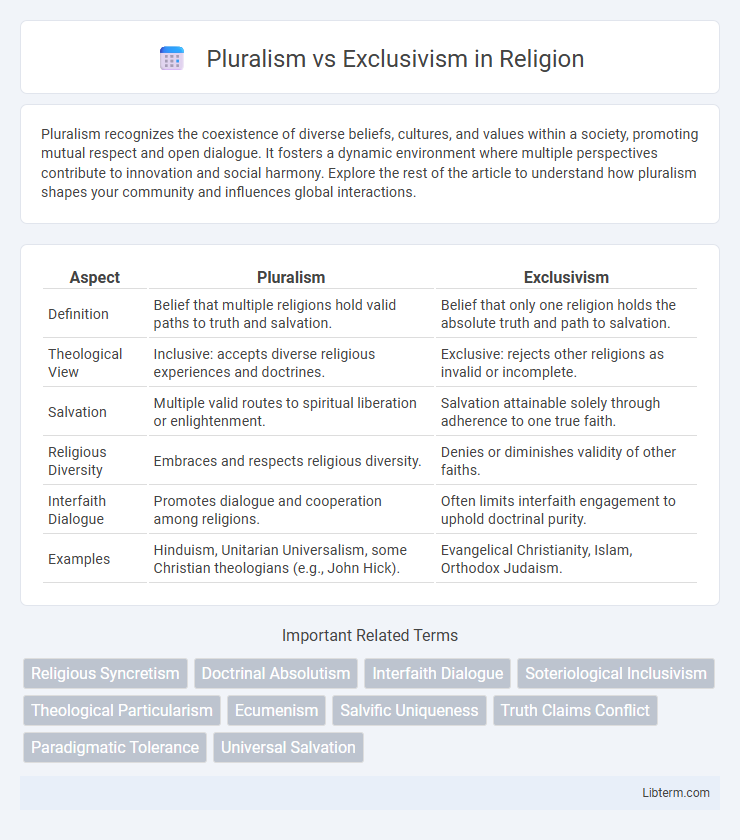Pluralism recognizes the coexistence of diverse beliefs, cultures, and values within a society, promoting mutual respect and open dialogue. It fosters a dynamic environment where multiple perspectives contribute to innovation and social harmony. Explore the rest of the article to understand how pluralism shapes your community and influences global interactions.
Table of Comparison
| Aspect | Pluralism | Exclusivism |
|---|---|---|
| Definition | Belief that multiple religions hold valid paths to truth and salvation. | Belief that only one religion holds the absolute truth and path to salvation. |
| Theological View | Inclusive: accepts diverse religious experiences and doctrines. | Exclusive: rejects other religions as invalid or incomplete. |
| Salvation | Multiple valid routes to spiritual liberation or enlightenment. | Salvation attainable solely through adherence to one true faith. |
| Religious Diversity | Embraces and respects religious diversity. | Denies or diminishes validity of other faiths. |
| Interfaith Dialogue | Promotes dialogue and cooperation among religions. | Often limits interfaith engagement to uphold doctrinal purity. |
| Examples | Hinduism, Unitarian Universalism, some Christian theologians (e.g., John Hick). | Evangelical Christianity, Islam, Orthodox Judaism. |
Understanding Pluralism and Exclusivism
Pluralism recognizes and respects multiple religious or cultural perspectives, emphasizing coexistence and the legitimacy of diverse beliefs. Exclusivism asserts that only one particular belief system or ideology holds the absolute truth, often rejecting alternate viewpoints as incorrect or invalid. Understanding pluralism involves appreciating the value of diversity, while comprehending exclusivism entails acknowledging the certainty and singularity claimed by a specific tradition.
Historical Roots of Pluralist and Exclusivist Thought
Pluralism traces its roots to ancient philosophical traditions like Stoicism and Enlightenment thinkers who embraced diversity and coexistence among different worldviews. Exclusivism finds its foundation in early religious doctrines, such as orthodox Christianity and fundamentalist movements, which emphasize a single, absolute truth and reject alternative beliefs. The historical evolution of these perspectives reflects ongoing debates about religious authority, interpretation, and the nature of truth in plural societies.
Key Philosophical Differences
Pluralism asserts that multiple religious paths or belief systems hold valid truths and can coexist harmoniously, emphasizing diversity and mutual respect. Exclusivism maintains that only one particular religion or belief system contains the absolute truth, often rejecting the validity of others. The key philosophical difference lies in pluralism's acceptance of religious diversity as truth-bearing, whereas exclusivism upholds a singular, exclusive claim to ultimate truth.
Religious Perspectives on Pluralism vs Exclusivism
Religious perspectives on pluralism versus exclusivism navigate the tension between acknowledging multiple faiths as valid paths to the divine and asserting one belief system as the sole truth. Pluralism promotes interfaith dialogue and mutual respect, emphasizing shared values and diverse spiritual expressions within global religions such as Christianity, Islam, Hinduism, and Buddhism. Exclusivism, often rooted in doctrinal claims, maintains that salvation or ultimate truth is accessible only through a specific religious tradition, shaping distinct communal identities and theological boundaries.
Pluralism: Benefits and Challenges
Pluralism promotes interfaith dialogue and mutual respect, fostering social cohesion and reducing religious conflicts in multicultural societies. It encourages inclusive policies that recognize diverse beliefs, enhancing freedom of religion and cultural exchange. Challenges of pluralism include potential relativism, difficulties in establishing common ethical standards, and tensions arising from conflicting religious values.
Exclusivism: Strengths and Criticisms
Exclusivism asserts that only one religion or belief system holds the absolute truth, providing clear moral guidance and a definitive framework for followers. Its strength lies in fostering strong community identity and commitment by offering unambiguous doctrines and salvation pathways. However, exclusivism faces criticism for promoting intolerance, marginalizing alternative beliefs, and potentially leading to religious conflicts due to its dismissive stance on pluralistic perspectives.
Impact on Interfaith Relations
Pluralism fosters mutual respect and cooperation among diverse religious traditions, promoting dialogue and peaceful coexistence by recognizing multiple paths to truth. Exclusivism often leads to tension and conflict in interfaith relations due to its insistence on the superiority of a single belief system. The impact on interfaith dynamics depends largely on the willingness of communities to engage openly and respectfully with differing theological perspectives.
Social and Political Implications
Pluralism promotes social cohesion and political stability by encouraging the acceptance of multiple cultural, religious, and ideological perspectives within a society, fostering inclusive policies and democratic participation. Exclusivism, often linked to rigid ideological or religious dominance, can lead to social polarization, marginalization of minority groups, and increased political conflict or authoritarian governance. The tension between pluralism and exclusivism significantly impacts policymaking, human rights protection, and the overall resilience of democratic institutions.
Case Studies: Pluralism vs Exclusivism in Society
Pluralism in society promotes the coexistence of diverse cultural, religious, and ideological groups, fostering mutual respect and understanding, as seen in multicultural cities like Toronto where multiple ethnic communities maintain their distinct identities while contributing to social cohesion. Exclusivism, on the other hand, prioritizes a single dominant identity or belief system, often leading to social exclusion or conflict, exemplified by nationalist movements in countries such as Myanmar, where minority groups face discrimination and marginalization. Case studies highlight the impact of these approaches on social harmony, human rights, and policy development, revealing the benefits of pluralistic inclusion versus the risks associated with exclusivist ideologies.
Moving Forward: Reconciliation and Dialogue
Promoting reconciliation and dialogue between pluralism and exclusivism requires fostering mutual respect and open communication among diverse religious and cultural groups. Emphasizing common values and shared human experiences can bridge ideological divides, enabling cooperative efforts toward peace and understanding. Initiatives such as interfaith forums, educational programs, and community engagement projects are essential tools to move forward beyond exclusivist barriers toward inclusive harmony.
Pluralism Infographic

 libterm.com
libterm.com